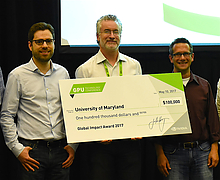 A team of computational biologists from the University of Maryland has been recognized by leading technology corporation NVIDIA for their role in the development of innovative software that provides a rapid analysis of biological sequence data.
A team of computational biologists from the University of Maryland has been recognized by leading technology corporation NVIDIA for their role in the development of innovative software that provides a rapid analysis of biological sequence data.
Michael Cummings, a professor of biology with an appointment in the University of Maryland Institute for Advanced Computer Studies (UMIACS), and Daniel Ayres, a doctoral student in UMD's Biological Sciences Graduate Program, received NVIDIA's Global Impact Award at the annual GPU Technology Conference in San Jose, California.
The award provides $100,000 to researchers using NVIDIA technology for groundbreaking work that addresses social, humanitarian and environmental problems.
The open-source software—known as BEAGLE, for Broad-platform Evolutionary Analysis General Likelihood Evaluator—is an essential component in the software workflow of many scientists studying the evolutionary history of organisms, including the viruses that cause AIDS, influenza and Ebola.
"Michael and Daniel have taken powerful technology from NVIDIA and built a system that truly can have an impact on public health," says Amitabh Varshney, interim vice president for research at UMD. "We are very proud of their work, and are grateful to NVIDIA for their support on this project and many other endeavors at the University of Maryland."
NVIDIA is an accelerated computing company that started out making graphic processor units (GPUs) for the gaming industry. Its GPUs are now used by academia, industry and other organizations for compute-intensive applications. This includes deep learning in artificial intelligence and the ability to crunch voluminous amounts of DNA sequence data.
Cummings first had the idea of using GPUs in 2003, but nascent development frameworks at the time weren’t very capable, he says.
The advent of NVIDIA’s CUDA parallel computing platform in 2007—soon followed by new GPUs for high performance computing, as well as financial support from the National Science Foundation—came together to enable the project.
Cummings says the open-source BEAGLE software has benefited greatly from collaboration with Marc Suchard, a professor at UCLA, and Andrew Rambaut, a professor at the University of Edinburgh, who both continue to be actively involved, as well as a community of other scientists contributing to the project.
Cummings and Ayres, working in UMD's Center for Bioinformatics and Computational Biology, had as an objective for BEAGLE to accelerate the study of evolutionary histories and relationships among individuals or organisms (e.g. species, strains), a process known as phylogenetic inference.
“BEAGLE has been useful for inferring the evolutionary history of influenza and Ebola,” Cummings says. “That has allowed scientists to try and see where outbreaks originated both geographically and in specific time periods.”
With the ability of high-throughput tools like BEAGLE to produce results quickly, researchers are helping public health agencies react to health threats, says graduate student Ayres, who handles much of the software design and programming.
“BEAGLE is used in a variety of studies that contribute to our understanding of evolution and biology, which can have a role in informing decision-making,” Ayres says. “The performance provided by GPUs is especially relevant in epidemiology, where one might be tasked with characterizing fast-spreading disease agents.”
The Maryland researchers are now focused on taking full advantage of NVIDIA’s powerful Pascal and upcoming Volta processor architectures to find ways to further increase the performance of BEAGLE.
"As we make new computing resources available to academia, industry and others, we also want to provide incentives for using the new technology in ways that can benefit society," says Tonie Hansen, senior director of corporate responsibility at NVIDIA. "The Global Impact Award is a part of that mission, and we look forward to further discoveries from the BEAGLE team."
—Part of the reporting for this article is from Samantha Zee, a senior writer for NVIDIA